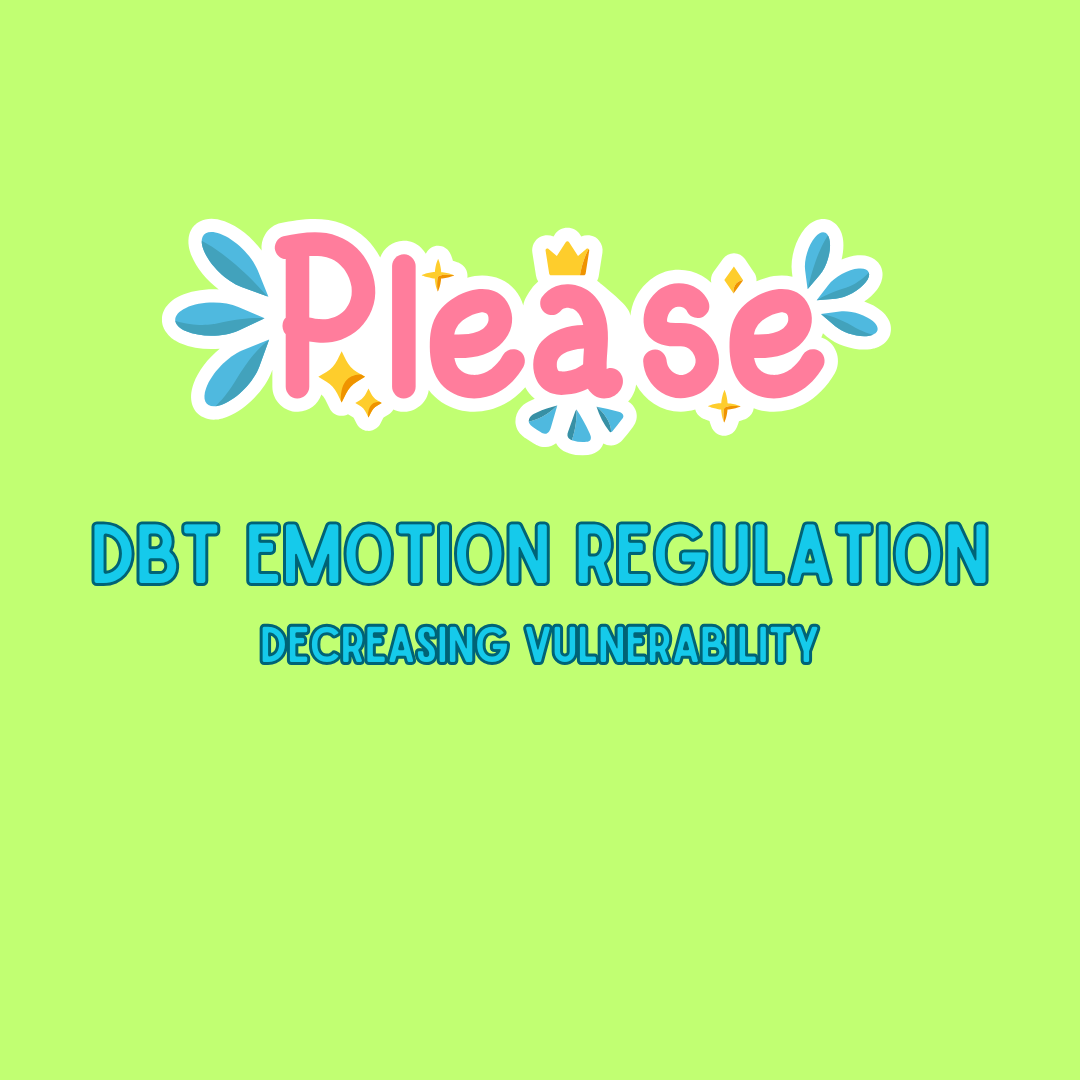DBT 101: PLEASE MASTER
PLEASE MASTER - Learn about this acronym in support of reducing vulnerability to emotion
Tools for Emotion Regulation
As we continue our blog series on DBT Skills for coping, we enter the DBT module or chapter called Emotion Regulation. Emotion Regulation skills have three primary goals: 1) to help us better attend to and understand our emotions, 2) to decrease our vulnerability to intense [negative] emotion and 3) to reduce emotional suffering. When we neglect our self-care, we can more easily become overwhelmed with emotions and engage in ineffective or impulsive behaviors. Think about it… you can see how we’re more vulnerable to “losing it” when overstressed, overtired, “hangry”, sick, or under the influence of alcohol or drugs….
In this blog, we’re going to focus on the skill of PLEASE Master, which is an acronym for a series of self-care-oriented skills that foster balance and can leave you physically and mentally more capable of controlling your thoughts and behaviors.
What is the PLEASE MASTER skill?
P - The “P” in PLEASE MASTER stands for “Treat Physical Illness.” This is an important reminder to be on top of medication and health needs. If you have a physical illness that needs attention or a daily medication regimen that needs to be followed, we want to be sure to address this first and foremost, so we are starting each day from our strongest possible place.
E - “E” stands for “Eating,” prompting us to remember that what we eat and drink can have an effect on mood, energy and overall sense of physical well-being. Eating regularly throughout the day and with a balance of different nutrients will keep your body and mind well-fueled and most prepared to manage what comes your way. For those who struggle with anxiety or difficulty sleeping, beverages with caffeine are best moderated.
A - “A” is for “Avoid Mood-Altering Drugs.” When we are under the influence of any substance, our ability to resist various urges and emotions is negatively impacted (e.g. substances like alcohol can function to make us feel more depressed. If we are feeling low mood or depressed at baseline, we would not want to exacerbate that mood state by using alcohol which also functions to lower our inhibitions). If you do use drugs or alcohol, take notice of how those make you feel and the function they serve. We can then select a more appropriate outlet for support.
S - “S” is about achieving balanced sleep. We all should plan to get ample and sufficient sleep to prevent feelings of irritability or agitation during the day. The amount of sleep each individual needs varies, but you can plan to incorporate anywhere from 5-10 hours into your daily schedule. When we are well-rested, we are more alert, aware, resilient and capable of navigating challenges that may come our way.
E - “E” is for Exercise. For most people, exercise is an important part of maintaining optimal health. Further, the neurochemicals and endorphins released during exercise function as natural antidepressants and can contribute to reduced anxiety. Regular exercise can occur in many ways, whether it’s a short workout video in your living room or a brisk walk with the dog. For individuals in treatment for eating disorders, exercise is a central and particularly delicate subject so it’s essential to honor your personal treatment guidelines when it comes to exercising safely and in a balanced way.
Building MASTERY
Building Mastery is the final component of the PLEASE Master skill set. Building Mastery means that we try to engage in activities each and every day that bring us a sense of accomplishment, joy, and confidence. By doing the things we are good at, we promote feel-good sensations and are reminded of our capabilities and strengths as individuals. When we feel self-confident and strong, we are all the more ready to tackle the day.As we begin to explore the module of Emotion Regulation, be sure to keep PLEASE Master in mind and observe your daily patterns and habits. Whenever possible, utilize this helpful acronym to ensure you are taking good quality care of yourself.

